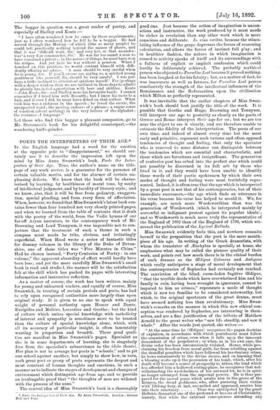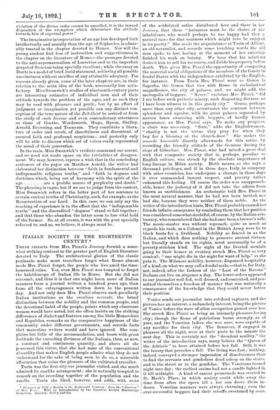POETS THE INTERPRETERS OF THEIR AGE.* IF the English language
had a word for the emotion at the opposite pole to "disappointment," we should cer- tainly use it to describe the impression left upon the mind by Miss Anna Swanwick's book, Poets the Inter- preters of their Age. True, the author's name on the title- page of any work soever, is a guarantee for the presence of certain valuable merits, and for the absence of certain un- pleasing defects. We know that the book will be charac- terised by learning, by healthiness of moral tone, by sanity of intellectual judgment, and by lucidity of literary style ; and we know, also, that it will be free from pedantry, exaggera- tion, special pleading, and from every form of affectation. When, however, we found that Miss Swanwick's latest book con- tains fewer than four hundred not very closely printed pages, and when we learned from the table of contents that it deals with the poetry of the world, from the Vedic hymns of our far-off Aryan ancestors, to the contemporary work of Mr. Browning and Lord Tennyson, it was impossible not to con- jecture that the treatment of such a theme in such a compass must needs be trite, obvious, and irritatingly superficial. When Hood wrote a series of fantastic titles for dummy volumes in the library of the Duke of Devon- shire, one of those titles was " Five Minutes in China." Had he chosen instead, " Forty Centuries of Poetry : in one volume," the apparent absurdity of effect would hardly have been less ; and yet the more carefully Miss Swanwick's small book is read and studie3, the warmer will be the satisfaction felt at the skill which has packed its pages with interesting information and instructive reflection.
As a matter of course, the work has been written mainly for young and unlearned readers, and equally of course, Miss Swanwick, in treating of certain periods and poets, has had to rely upon recognised authorities more largely than upon original study. It is given to no one to speak with equal weight of personal authority upon Homer and Dante, Euripides and Moliere, Lucretius and Goethe ; but the kind of culture which unites special knowledge with catholicity of interest and sympathy is sometimes more to be trusted than the culture of special knowledge alone, which, with all its accuracy of particular insight, is often lamentably wanting in proportion and breadth. These good quali- ties are manifest in Miss Swanwick's pages. Specialist as she is in some departments of learning, she is singularly free from the specialist's subservience to the idola theatri. Her plan is not to arrange her poets in " schools," and to pit one school against another, but simply to show how, in turn, each great poet or group of poets represents the deepest and most constant of human thoughts and emotions, in such a manner as to indicate the stages of development and changes of environment which distinguish age from age, and to provide an irrefragable proof that " the thoughts of men are widened with the process of the suns."
The central idea of Miss Swanwick's book is a thoroughly
• Poeta the Inteeireters of their Age. By Anna Swanwick. London: George Bell and Sons.
good one. Just because the action of imagination is uncon- scious and instructive, the work produced by it must needs be richer in revelation than any other work which is more conscious and deliberate. In vino veritas, because the stimu- lating influence of the grape depresses the forces of reasoning calculation, and allows the forces of instinct full play ; and in healthier fashion, the nature in which imagination is roused to activity speaks of itself and its surroundings with a fullness of explicit or implicit confession which could hardly be deliberately achieved. The probably mythical person who objected to Paradise Lost because it proved nothing, has been laughed at for his fatuity; but, as a matter of fact, he was inaccurate as well as fatuous, for Paradise Lost proves conclusively the strength of the intellectual influences of the Renaissance and the Reformation upon the civilisation which Milton so perfectly represented.
It was inevitable that the earlier chapters of Miss S wan- wick's book should best justify the title of the work. It is possible that Goethe and Hugo, Browning and Tennyson,
will interpret our age to posterity as clearly as the poets of Greece and Rome interpret their age for us ; but we are too near the object to see it clearly, and are therefore unable to estimate the fidelity of the interpretation. The poets of our
own time, and indeed of almost every time but the most early and primitive, represent such various and often opposed tendencies of thought and feeling, that only the spectator who is removed to some distance can distinguish between the tendencies which are essential and characteristic, and those which are fortuitous and insignificant. The generation of centuries past has orbed into the perfect star which could not possibly be discerned in its full orb by those who lived in it, and they would have been unable to identify those words of their poetic spokesmen by which their own
modes of thought and feeling were most truthfully repre- sented. Indeed, it is often true that the age which is interpreted
by a great poet is not that of his contemporaries, but of their immediate successors,—the age which finds an utterance in his verse because his verse has helped to mould it. We, for example, are much more Wordsworthian than was the generation of Wordsworth (which he interpreted mainly by sorrowful or indignant protest against its popular ideals) ; and so Wordsworth is much more truly the representative of the England of 1892 than of the England of 1798, which wit- nessed the publication of the Lyrical Ballads.
Miss Swanwick evidently feels this, and nowhere commits herself to the proposition that the poet is the mere mouth- piece of his age. In writing of the Greek dramatists, with whom the translator of .ZEschylus is specially at home, she emphasises what may be called the pioneer quality of their work, and points out how much there is in the ethical burden of such dramas as the CEdipus Coloneus and Antigone which really anticipates a stage of moral development that the contemporaries of Sophocles had certainly not reached.
The conviction of the blind, curse-laden fugitive Edipus, " that the terrible deeds which have overwhelmed him and his family in ruin, having been wrought in ignorance, cannot be imputed to him as crimes," represents a mode of thought which is now too familiar to be considered noteworthy, but which, to the original spectators of the great drama, must have seemed nothing less than revolutionary. Miss Swan- wick's remarks on the manner in which this new ethical con- ception was rendered by Sophocles, are interesting in them- selves, and are a fine justification of the tribute of Matthew Arnold to the great writer who "saw life steadily, and saw it whole." After the words just quoted, she writes :—
" At the same time he [(Edipus] recognises the pagan doctrine of expiation, in accordance with which punishment must follow the commission of crime, even when it falls upon the innocent descendant of the perpetrator ; or when, as in his own case, the divine order has been unconsciously violated. Hence, while pro- claiming his freedom from moral guilt, far from rebelling against the dreadful penalties which have followed his involuntary crime, he bows submissively to the divine decree, and on learning that a blessing waits upon the possession of his tomb, which, after his death will become a source of prosperity to Attica, the land which has afforded him a hallowed resting-place, he recognises that not- withstanding the wretchedness of his outward lot, he is in spirit no longer estranged from the supernal powers. He is thus pre- pared for the sacred peace which awaits him in the grove of the Erinyes, the dread goddesses, who, after pursuinv, their victim with lifelong fury, at last, reconciled and appeased, receive him
into their sanctuary Thus was anticipated by the great Hellenic dramatist one of the profound-•st lessons of Christianity, namely, that while the external consequences attending any
violation of the divine order cannot be annulled, it is the inward disposition of the wrongdoer which determines the attitude towards him of supernal power."
The imaginative interpretation of an age less developed both intellectually and morally than the age of Sophocles, is admir- ably treated in the chapter devoted to Homer. Nor will the young student find less of instruction and suggestiveness in the chapter on the literature of Rome,—the passages devoted to the anti-supernaturalism of Lucretius and to the imperfect gospel of Stoicism being specially excellent; while the essay on Dante is a model of brief, lucid statement, achieving all possible succinctness without sacrifice of any attainable adequacy. For reasons already given, some of the later chapters are, in their relation to the main idea of the book, necessarily less satis- factory. Miss Swanwick's studies of nineteenth-century poets are interesting estimates of individual men and of their attitude towards the problem of the ages, and as such they may be read with pleasure and profit ; but by no effort of judgment or imagination yet possible can any distinct con- ception of the true nature of the Zeit-Geist be arrived at from the study of such diverse and even contradictory utterances as those of Goethe, Wordsworth, Hugo, Byron, Shelley, Arnold, Browning, and Tennyson. They constitute a litera- ture of order and revolt, of cheerfulness and discontent, of assured faith and profound scepticism ; and posterity only will be able to discern which set of voices really represented the mood of their generation.
In the main, Miss Swanwick's verdicts command our assent, and we need not waste space on the trivialities of disagree- ment. We may, however, express a wish that in the concluding sentences of the paper on Matthew Arnold, the writer bad elaborated her distinction between " faith in fundamental and indispensable religions truths," and "faith in dogmas and doctrines which, being out of harmony with the spirit of the age are a prolific source of perplexity and doubt." The phrasing is vague, but if we are to judge from the context, Miss Swanwick refers in the latter part of her sentence to certain central truths of Christianity, such, for example, as the Resurrection of our Lord. In this case, we can only say the teaching of experience is to the effect that the "indispensable truths " and the discredited " dogmas " stand or fall together ; and that those who abandon the latter seem to lose vital hold of the former. So, at all events, it was with the poet specially referred to, and so, we believe, it always must be.



































 Previous page
Previous page